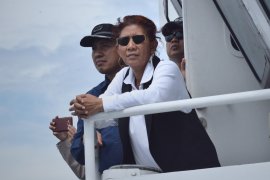Support for the move has been voiced by various sides in Indonesia, such as businesses, the military and legislators.Jakarta (ANTARA News) - Indonesia has detained 155 foreign fishing vessels and, on Friday, sunk three of them, a stern measure lauded by all sides at home to clear the countrys water of foreign fish poachers.
"We have detained five large foreign ships and 150 other small ones across the country last week. We sunk three of them on Friday to teach them a lesson, so that they will give up poaching in Indonesian waters," President Joko Widodo (Jokowi) said in a discussion with local fishermen in Gorontalo on Saturday.
Jokowi, who was inaugurated as Indonesias seventh President last October, has repeatedly said the country has lost some Rp300 trillion annually from illegal fishing and that there are currently 5,400 illegal ships operating in Indonesian waters, due to a lack of decisive action by the government.
Three Vietnamese boats, which have been proven to have illegally fished fish in Indonesian waters, were made to explode by the Indonesian Navy off the Anambas Island waters, Riau Islands, on Friday.
"We have been planning the sinking operation since Friday morning. Three fishing ships were going to be sunk. They were all from Vietnam," the Head of Information Office of the Indonesian Navy, First Admiral Manahan Simorangkir, was quoted as saying by local online media on Friday.
Indonesian Maritime Affairs and Fisheries Pudjiastuti has promised she will personally witness the sinking of other foreign vessels in Batam, after the sinking of the Vietnamese ships.
"We have sunk three Vietnamese fishing vessels today. And tomorrow I will sink larger vessels myself in Batam, Riau Islands," the minister was quoted by detik.com news portal as saying on Friday.
Besides in Batam, Indonesia has also scheduled to sink other foreign vessels in the Aru Sea, in the eastern Indonesian region, next week.
The public expressed hope that the sinkings would continue until the countrys waters were free from poachers and local fishermen could be free to maximize their fish catches.
According to President Jokowi, the Indonesian government is taking such stern action in an effort to reduce illegal fishing and assure that there will no longer be foreign fishermen entering Indonesias waters.
He said that the governments decision to take stern measures against illegal fishing is intended to help Indonesian fishermen to profit from the countrys sea wealth.
So far, Indonesia has not yet tapped its full fishing potential and the country remains weak in protecting its marine sector, which has a potential revenue of US$1.2 trillion a year, said officials.
Weak control over the marine wealth has enabled foreign poachers to steal the countrys fish, which, according to the Food and Agriculture Organization (FAO), amounts to Rp300 trillion per annum.
Based on the calculations of the Peoples Coalition for Fishery Justice (Kiara), the state lost Rp101 trillion to illegal fishing between January and August 2014, during which a total of 1.6 million tons were illegally fished from Indonesian waters.
Therefore, the governments move to sink illegal fishing vessels has gained wide support at home, hoping the action will continue to be taken until the countrys waters are cleared of fish poachers.
Earlier, Foreign Minister Retno Marsudi said the move to sink foreign poachers is not an illegal action, also saying it is not a barbaric act, but rather a move to provide a deterrent effect so that illegal fishermen will stop poaching in Indonesian waters, in a bid to assure Indonesias maritime economic sovereignty.
Meanwhile, Professor Salim Said of the Defense University expressed hope that the government will be consistent in its measures and continue to sink foreign fishing ships found poaching fish in Indonesian waters.
"The government should not lessen its stern action in order not to give a chance for foreign fishing ships to return to Indonesian waters," Salim Said stated, when contacted on Friday.
The government should show its consistency by increasing the number of naval ships and the amount of funds for the procurement of fuel for warships. It is useless to possess naval ships if they cannot be deployed due to shortages of fuel.
Salim said he appreciated the move by the government, which has taken strong actions against foreign boats that poached fish in Indonesian waters. The government should not allow illegal fishing to occur in its waters, he said.
"Indonesia has regulated in its law the sinking of foreign ships. Foreign vessels can be sunk to offer a lesson when they fish illegally in Indonesian waters," Salim added.
He noted that every country has laws and regulations which had to be abide by. The country of origin of the poachers cannot intervene in Indonesian law, he noted.
"If an Indonesian citizen faces beheading in Saudi Arabia, for example, Indonesia cannot intervene. It cannot force Saudi Arabia to follow Indonesias law," Salim stated.
The West-East Care Foundation (YPTB) also supported the governments move to explode foreign vessels that were illegally fishing in Indonesia waters.
"The governments move to sink the vessels is important. It is important to uphold the sovereignty of the Unitary State of Indonesia (NKRI) in all water territories of the country, including the East Timor Sea, based on the international affairs and on geological and geomorphology facts," said YPTB chairman Ferdi Tanoni.
Former maritime and fisheries minister Freddy Numberi also said he appreciated the governments move.
"It is good for Indonesia to sink the ships and let the international world know it," said Freddy Numberi on Friday. Yet, he recalled that the move should be taken in measured steps, among others, by explaining the sinkings transparently.
Catch Fish Director General of the Ministry of Maritime Affairs and Fisheries Gellwynn Jusuf said Minister Susi Pudjiastuti had coordinated and discussed the actions with a number of neighboring countries.
Minister Susi explained that representatives of various foreign countries she met with have supported her policy in cracking down on fish poaching in Indonesia waters.
Further, support for the move has been voiced by various sides in Indonesia, such as businesses, the military and legislators.(*)
Reporter: Andi Abdussalam
Editor: Heru Purwanto
Copyright © ANTARA 2014











